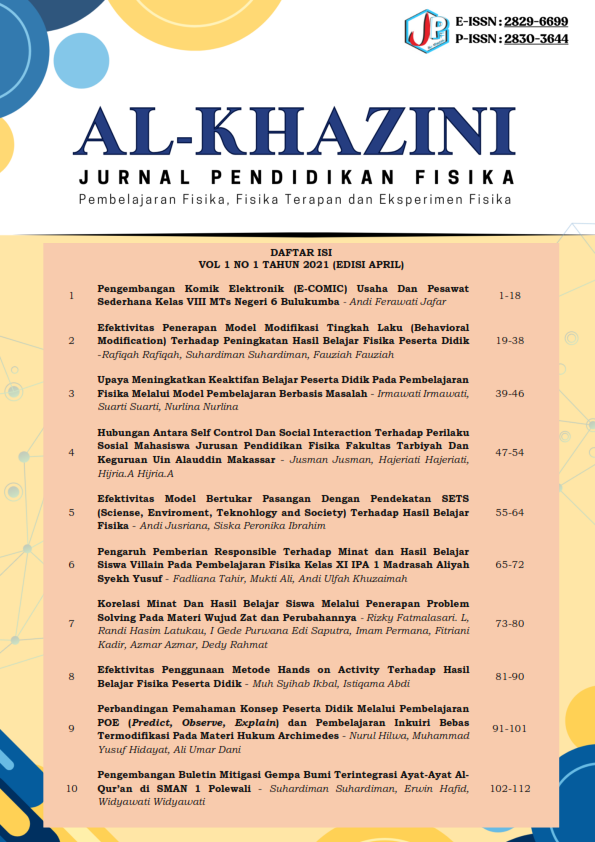Efektivitas Penerapan Model Modifikasi Tingkah Laku (Behavioral Modification) Terhadap Peningkatan Hasil Belajar Fisika Peserta Didik
Abstract
This research is a Quasi Experimentalstudy which aims to describe the increase in student learning outcomes before and after being taught using a behavior modification model and to determine the effectiveness of behavior modification models on increasing student competitiveness. The researchdesign used was Time Series Design. The population in this study were all class X MIA 1 SMAN 1 Woha, totaling 36 people. The research sample consisted of 36 people. Sampling was carried out by means of convenience sampling. The results of descriptive research indicate that the average value of physics learning outcomes of students who before being taught uses a behavior modification model (Behavioral Modification). At the first meeting it was 51.67, at the second meeting it was 52.77, at the third meeting it was 56.28, and the three scores were in the sufficient category. While the average value of students' physics learning outcomes after being taught using a behavior modification model (Behavioral Modification). At the fourth meeting it was 80.83, at the fifth meeting it was 85.36 and at the sixth meeting it was 88.05. The three values are in the good category. Furthermore, the data obtained using the Wilcoxon Matched Pairs test obtained a significant value of 0.00 <0.05. So that there are significant differences in student learning outcomes before and after being taught with a behavior modification model.
Downloads
References
Choyl S. Chee, Joanne Sau-Ching Yim1, dkk, A Metacognitive Knowledge, Metacognitive Experience, and Its Effects on Learning Outcomes for Stem and Non-Stem Malaysian Students, International Journal of Advanced Research in Education and Society e-ISSN: 2682-8138 | Vol. 2, No. 1, 1-14, (2020)http://myjms.moe.gov.my/index.php/ijares, hal 2 http://103.8.145.246/index.php/ijares/article/view/8302(Diakses 20 juni 2020)
Departemen agama RI.Al –Qur’an dan terjemahannya. Bandung : CV Penerbit J. ART,2004.
Hamalik Oema. 2009. Proses Belajar Mengajar. Cek X; Jakarta Bumi Aksara
Dani, A. U., & Hilwa, N. (2020). Perbandingan Pemahaman Konsep Peserta Didik Melalui Pembelajaran POE dan Pembelajaran Inkuiri Bebas Termodifikasi. JPF (Jurnal Pendidikan Fisika) Universitas Islam Negeri Alauddin Makassar, 8(2), 118-126.
Hamalik Oema. 2004. Proses Belajar Mengajar. Jakarta : Bumi Aksara
Jeyce Bruce, Weil Marsha, Calhoun Emily. 2009. “Model Of Teaching Model-model Pembelajaran.” Yogyakarta: Pustaka Pelajar
Kunandar. 2014. Penilaian autentikn(Penilaian hasil beajar peserta didik berdasarkan kurikulum). Jakarta: PT Rajagrafindo Persada.
Purwanta, Edi, dkk. 2014. Pengembangan Model Modifikasi Perilaku Terintegrasi Program Pembelajaran untuk Anak dengan Masalah Perilaku. Jurnal Cakrawala Pendidikan. Vol 33 No. 2. Hal 199-210
Rusyidi, Rifqi. 2016.Buku Guru AL – Qur’an Hadis Kelas XII Madrasah Aliyah K-13. Jakarta : Kementrian Agama
Saputra Afriyola, Djusmaini Djamas, dan Yulkifli. 2013. “Pengaruh Strategi Pemecahan Masalah Sistematis berbantuan solution path online (SOP) Terhadap Hasil Belajar Fisika Siswa Kelas X SMAN 2 Batang Kapas.” Jurnal Pendidikan Fisika Vol.1
Suprijono, Agus.2011.Cooperative Learning.Yogyakarta : Pustaka pelajar.Hal. 17.
Sudjana Nana, 2015 Penelitian Hasil Proses Belajar Mengajar. Bandung: Rosdakarya
Sudjana Nana dan Rivai Ahmad. 2003. Teknologi Pengajaran. Bandung: Sinar Baru Algensindu. Hal. 123
Tiangka Safril, Qaddafi Muhammad, Suhardiman. “Penerapan Model Pembelajaran Kooperatif Kancing Gamerincing Terhadap Peningkatan Minat Dan Hasil Belajar Peserta Didik.” Jurnal Pendidikan Fisika Vol.6. No. 1 (2018)
The Authors submitting a manuscript do so on the understanding that if accepted Al-Khazini:Jurnal Pendidikan Fisika for publication, copyright publishing of the article shall be assigned/transferred to Physics Education Department, UIN Alauddin Makassar as Publisher of the journal. Upon acceptance of an article, authors will be asked to complete a 'Copyright Transfer Agreement'. An e-mail will be sent to the corresponding author confirming receipt of the manuscript together with a 'Copyright Transfer Agreement' form by the online version of this agreement.
Al-Khazini:Jurnal Pendidikan Fisika and Physics Education Department, UIN Alauddin Makassar, , and Physics Society of Indonesia as the Editors and the Advisory International Editorial Board make every effort to ensure that no wrong or misleading data, opinions or statements be published in the journal. In any way, the contents of the articles and advertisements published in the Al-Khazini:Jurnal Pendidikan Fisika are the sole and exclusive responsibility of their respective authors and advertisers.
The copyright form should be signed electronically and send to the Editorial Office in the form of the original e-mail: [email protected]

